- Home
- Ian McDonald
Out on Blue Six Page 28
Out on Blue Six Read online
Page 28
Kansas Byrne clung close to the tall, faraway man, dangerous protection in her eyes.
“My name is Kilimanjaro West.”
“Well, Kilimanjaro West, Angelo Brasil has a lot to thank you for. Bror …” He extended his hand; brotherhood offered, and received.
“Hello, Courtney, it’s nice to see you, how are you?” said Courtney Hall with inappropriate petulance.
“Hello, Courtney, nice to see you, how are you, let’s go,” said Angelo Brasil.
“Let’s go,” echoed Courtney Hall, miffed at losing her one brief taste of authority.
“You know each other?” asked Kansas Byrne.
“Unfortunately, yes,” said Courtney Hall. They went. Down through the chaos of prancing people and ringing bells and running policemen and showering synthetic snow and ricocheting shock charges: the Man with the Computer Brain and his cat led the ex-cartoonist and the Advocate and the Raging Apostles and backmarking, V. S. Pyar, ploughing along with the Amazing Teleporting Woman in the arms that would have graced Glory Bowl DCCLX, down down fire escapes, down down back stairways, down down service-elevator shafts. Perfectly in his domain; Angelo Brasil had never enjoyed himself quite so much; sowing anarchy and disorder from each hand. “Left here!” he shouted over the clang and the clatter. The entire schematics of West One were projected onto his visual cortex. “Don’t hang about, down here, keep moving, I’ll catch up with you!” The escapees poured into a fire exit as he paused momentarily to locate the codes that sealed the fire shutters between levels six and seven. Armored doors closed weightily on lunacy and jubilation.
“Down and out!” shouted the liberated. “Down and out! Freedom and light!” And they came boiling out of the brass doors of West One (five times the height of an athleto), capering down the marble steps in a torrent of jiving black rubber. Three Love Policemen foolish enough to stand in their path were swept away in the inundation. Pursuit teams knelt on the inlaid golden mottoes praising the virtues of Social Compassion and aimed sniping shots at rubber-clad heels, but there were too many targets too far too furious. Overhead, pantycars flocked and whirled and interrogated each other on the tellix—just what the … was going on.
While the grandest jailbreak in history was seeping away into the warren of dark alleys that enveloped West One, at the back door the Raging Apostles plus three arrived in the underground vehicle park. Black-and-silver ministry beetles stood among the squat concrete pillars in various stages of dismemberment. There is something universal about underground carparks. Something in the way the artificial light reacts with exhaust fumes. A humming, whistling migro grease-monkey looked up from under a hood, froze. Trashcan the cat hissed at him, bared steel. He fled, and they had the carpark to themselves.
“So, we drive out?” said M’kuba. Angelo Brasil shook his dreads, pointed to a ventilation grille in the wall.
“We slide out.”
“Slide out where?” This from Kelso Byrne.
“Out of here.”
“DeepUnder,” said Courtney Hall.
“Damnation,” said the Man with the Computer Brain. “Escape’s off. Unless someone’s got a screwdriver.” A Series 000 biocomputer could turn the very heart of the Ministry of Pain to quicksand but was quite useless when faced with four crosshead screws overpainted with several coats of regulation Ministry burnt-yellow.
No pockets in West One fashions.
“Isn’t that just typical?”
V. S. Pyar laid Xian Man Ray down tenderly on a bundle of oily rags. He bowed solemnly to the grille, took a deep breath. Muscles appeared out of nowhere under his stretched restraint suit. Ten fingers through the mesh; one gasp-roar of exertion and the way to sweet freedom was clear.
“Well, come on, hurry it up, don’t stand there gaping,” ordered Angelo Brasil. “I can’t hold them forever. Who’s first?”
Joshua Drumm poised himself on the lip of the smooth metal shaft that sloped away into invisibility. He looked down between his feet.
“Rather an undignified way to go into exile, don’t you think?”
“Just you get your tail down there, bror,” Angelo Brasil said, and gave him a shove. He went down with a small wail of alarm. “Welcome to the DeepUnder. Who’s next?”
God Prefers Gothic …
LONG AGO, IN THE days before God the Three in One Person Blessed Trinity’s divine schizophrenia caused Him to schism into God the five hundred and thirty-six persons, Blessed Polytheon, St. Damien’s in the Catacombs had been a cathedral.
Cathedral, clunkhead, as in the principal church of a diocese, the seat or throne of a bishop; church as in chapel, basilica, abbey, temple, meeting house, as in building designed as a place of worship, as in house for God. Got it now? Why? Because in those days God the invisible and indivisible could only be approached through the mystery of faith. Yes, faith, sib: then you couldn’t just punch up God: full specifications on your Lares and Penates unit; you didn’t get pills in your butsudan when you were low or visits from the MiniPain counselor when something bothered you as proof that the divine eyes were watching over you; the Hand of Providence wasn’t tattooed “Food Corps” or “Universal Power and Light” or “SHELTER” or “Greater Yu Rapid Transit Authority”: you believed in what you could not see. Yes, I know. Maybe that’s why they built temples and shrines and cathedrals so big.
And maybe that was why they built them the way they did: maybe God liked Gothic, maybe heaven was all Early English Decorated flying buttresses, piers, arches, fan vaults, machicolations, spires, cloisters, and chapter houses, with plaster angels playing trumpets and plaster saints with their hands fused together in an attitude of prayer for all eternity and their eyeballs rolled up in their hollow heads, with maybe the odd gargoyle sitting around on the edge of heaven to keep the clawing hands of the clawing masses of the damned off the gingerbread. If faith smelled like wood polish and old, cold granite, then St. Damien’s in the Catacombs had been a little drop of heaven on earth.
Of course, it had not been the cathedral church of the catacombs, then, though for the final fifty years of its consecrated life fewer and fewer of the faithful had come through its revolving doors as more and more found the mystery of faith harder and harder for them. Fewer and fewer, until even God realized that Faith was too much a mystery for man and thought of something easier. It was not until the arcological hordes of Mammon under the command of the new revelation that God was many rose up on all sides that it became first the Church of the Shadows, and finally—walled in, roofed over, culverted, piped, conduited, abandoned, and deconsecrated in the general apostasy to the new covenant—St. Damien’s in the Catacombs.
Chapter 11
XIAN MAN RAY THE Amazing Teleporting Woman opened the cloister door into the cathedral and ushered her small tour party into the nave. And her tourists, Kelso Byrne and V. S. Pyar, came face-to-face with the marvelous. Imagine that instead of being buried and mustified under multimegatons of Social Architecture, the cathedral had stood for half a millennium in a rain forest. (Imagine that there is still such a thing as a “rain forest.”) Imagine a subtle transubstantiation breaking free from its confinement in host and wine and altar and spreading throughout the body of the church so that the piers and pillars become the boles of great trees and the lacework stone fan vaulting becomes the interwoven lattice of branches. For sandstone flutings and traceries substitute Medusa-tangles of lianas and flowering vines, for the thrusting stone buttresses substitute the massive root systems of tropical trees, for the leering lewd gargoyles substitute monkeys and lemurs and sloths. Imagine cool, green shade and the dapple patterns of light through a canopy of leaves. Imagine all this, and then as the host is both physical bread and transubstantial body, fuse these two visions together, the botanical with the architectural, wood and stone, organic and inorganic, the green and the gray. Crisp geometrical outlines softened with biology’s softer contours. Stark verticals muted by sinuosities of vines and creepers; the rose window a riot of color, stain
ed-glass saints and patriarchs breaking out in flowers. Hanging from the capitals and the roof beams, clusters of pendulous green fruit like outrageous translucent eggplants. And hidden in the vines: faces, furs, fangs, feathers, long curving fingers; cool, low twittering voices, up there under the roof timbers never quite there when you look for them.
“There, I saw one.”
Kelso Byrne pointed up at a knot of pulsing vine-arteries into which a rainbow-striped ivory-fanged face had vanished. “What was it?”
“One of Dad’s little pets.” The nave was lit by pods of what could only be described as luminous grapefruit. Biological chandeliers. “Could be one of his eaters.”
“Eaters?”
“Only plant crap, my friend. Leaves. Things like that. Pretty much a closed environment in here. Everything recycled.” They proceeded up the center aisle to the choir. The same sacramental spirit that had transformed the church body had touched the choir screen and stalls; intricately scrolled and molded woodwork had broken out in real flowers. V. S. Pyar traced a finger along a tightly wound mahogany spiral to the point where handcrafted simulation became green sprouting reality.
“I’ve seen panelwood walls and livegrass carpets and things like that but never anything like this,” Kelso marveled.
“That’s just Dad. Never content with what he’s got. Always has to be improving.” Xian Man Ray shrugged. “He likes to be totally independent of the Compassionate Society. He’s not quite at that stage yet: St. Damien’s generates its own power, biogas, airco, water purifiers and recyclers, and the thing’s pretty much one big symbiotic organism, but there’s one thing the Compassionate Society provides which we can’t do without.”
“What’s that?”
“Shit. Honest. The only thing we need from the Compassionate Society is the thing it doesn’t. Raw sewage. Plants thrive on it. We’ve got North Ran arcology above our heads, and they won’t miss a few tons of shit out of the four hundred they flush down their crappers every day. We have filterers and scrubbers Dad adapted from water hyacinths that are so good you could stick a glass under the outflow pipe and drink it.”
“I might pass on that,” said V. S. Pyar.
Xian Man Ray pointed up. The ceiling vault had been removed, and the empty spire space had been filled with large translucent green balloons, expanding and contracting like lungs. “The airco up there is another of Dad’s adaptation jobs: he cut a few genes on an aquatic bladderwort. He could sell these to SHELTER, they’re much more efficient than any comparable mechanical system. But, well, he has to preserve his anonymity. That was one of his early designs, one of the first things he did to this place. The new apts out behind the chapter house and Dad’s labs are totally bio. Feel free to have a look round. Nothing’ll touch you, it’s hundred percent biosafe.”
V. S. Pyar’s explorations led him twenty meters up the north transept pillar, finding foot/handholds in the coils of vines and creeper. She thought he had rather a nice smile.
St. Damien’s in the Catacombs resonated to a single sonorous bass note. Kelso Byrne had found the ancient cathedral organ and was running intrigued fingers over the yellowed ivory manuals and stops. Theme and variations chased each other around the columns and arches like little creatures. Vox humana sang counterpoint to vox angelica while the bass pedals boomed out the all-inspiring vox dei.
“Would you have a look at this?” said Kelso Byrne. “You don’t need any electricity for this thing.” Kyries and benedictions and Te Deums came bubbling from his pipes and flocked and bickered in the pale green vaults of St. Damien’s.
Five minutes after meeting her he had decided: “I am going to make love to that woman.” And once decided, every word, every deed, every thought and action contained within it that seed of ulterior motive. The two-day trek from West One to St. Damien’s had not been easy; hungry, hard, and heavy even for experienced DeepUnders, and all he had been able to think about was, “What does she look like with no clothes on?” That, and “I wonder how I can get her away from that lump she hangs around with?” From gratitude, and wonder, to envy and great-lumpdom in three hundred seconds. As they edged one by one along the twenty-centimeter ledge beside a torrent of running sewage: “I wonder what her ass looks like?” As they abseiled on monomolecule spinnerets down a two-hundred-meter airshaft, buffeted and bruised against the curving metal wall by the fifty-kilometer-per-hour gale howling out of the depths: “Will she be loud or quiet? Soft or hard?” And as they were approaching through the fields of eyes that surrounded St. Damien’s and kept its secrets safe: “Dad’s bound to want to talk to this Kilimanjaro West suck, and then I’ll make my move. Talk her into a private tour of St. Damien’s or something, and while they’re talking computers and gods, we’ll be quietly rammin’.”
And now, here they were, here he was, walking her through the cloisters and trying to impress her by telling her how all the cybernetic systems he had created and monitored made St. Damien’s invisible and intangible to the Ministry of Pain and the Department of Environmental Maintenance; that he, Angelo Brasil, was in effect the first and only effective line of defense between them all and the righteous wrath of the Love Police—don’t you think that’s kind of a big responsibility for a bror who’s not long turned twenty, neh? All the while thinking, “I am going to take off all your clothes.”
And was she impressed, was she in the least interested? The fug she was, she was too busy cooing and gushing over Dad’s collection of icons, I mean to say, what were they but a lot of stale and musty old celibates not even God remembered anymore, but here she was wowing and wawing over them, going on about the divine light captured in pigment, the timeless mood of transcendent serenity, the sense of eternal values and absolute morality; absolute morality, fug, my dear, ten minutes on his livefur carpet and she’d be wowing and wawing fit to make the old saints cover their ears.
Undeterred, he steered her from the cloisters into the conservatories, soft sensuous bubbles of organic polymer heavy with warm, wet air and misty light and a sexual wonderland of possibilities. They walked beneath weeping fronds and splayed green leaf-fingers, and he licked his lips and wiped his hands on his new pair of cycling shorts, an action that did not have everything to do with the warmth. Shug, do I look all right, is there a mirror in here? What was that she was saying?
“Pardon?”
“I wanted to know who this Dad of yours is, who could build such a beautiful place.”
Patience. Tell her the story. “You’ll find this pretty hard to believe.”
“Try me.” With pleasure. What? Oh. “After the past few weeks I can believe any number of impossible things, before or after breakfast.”
“Dad, our adoptive father, was a yulp waiter in a fish restaurant.”
“You’re right. I should have taken your word.”
“Apparently there was a mix-up over his professional aptitude ratings. So he claims. Some junior clerk in the Department of PersonPower Aptitude and Vocational Analysis keyed in the wrong code. Well, you’d know better than I, but it seems that it’s virtually impossible to get the Ministry of Pain to admit it’s made a mistake.”
“No ‘virtually’ about it. It is. Go on.”
He invited her to sit with him on the edge of a foamstone tank of water hyacinths. She declined. Try something else. They progressed forth.
“Dad was convinced he was a genius, of course. He’d never seen the results of his tests when he was a kid, but he just knew that he was in the wrong place. He complained to the Department that he was not happy as a waiter in a fish restaurant; what he thought he should be was a biological engineer. Well, of course, the Ministry of Pain would have nothing like that. A fish waiter you are, a fish waiter you will remain.’” At least she’d smiled at his funny voice.
“Old story,” she said.
He had to keep biting his lip each time she smiled.
“Dad could not be convinced otherwise, so he took up bioengineering. Quite legally at first: pet kit
s, tailored interior decor plants, the like. Then he ventured into more clandestine stuff; mostly for wingers, improving on Dame Inheritance, a few cunning little animated sextoys. Then he went on to do some work for athletos, performance enhancers, and a Soulbrother group who were into radical transplant surgery, thought it was holy or something like that.”
“The Carnal Plenum,” she said.
“Some of your own people, tlakhs, came for body reorientation and response rejiggering; some had limbs rejointed. You’re a dancer, aren’t you? Just think what you could do with improved muscular control and true double-jointed limbs.”
She popped his obscene little fantasy by saying, “Actually, I’m a performance artist.”
He was oblivious to the mild gaffe. “Even though this was all off-famulus work, it was only a question of time before the Love Police were bound to get interested. Tell me, what’s it like to know you’re being watched, every hour of every day, everything you do, watched by a famulus?”
“Like believing in God,” said Kansas Byrne. “A God who doesn’t give a fug. You get brought up to believe the Compassionate Society runs on benign incompetence; all those people get promoted beyond their ability because it will make them happy. You grow up to believe, like anyone who believes in God, that maybe there are things God can’t see, which he’ll pass over, that he’s too busy doing something too important somewhere else to bother with little you. You get blasé. You think, maybe a lot slips through the fingers. Except that’s what they want you to think. And it doesn’t.” She consented to wasted moments in the shade of a geneform climbing fig.

 Empire Dreams
Empire Dreams The Menace from Farside
The Menace from Farside Luna: Moon Rising
Luna: Moon Rising Moon Rising
Moon Rising Desolation Road dru-1
Desolation Road dru-1 Empress of the Sun
Empress of the Sun Ares Express dru-2
Ares Express dru-2 Tendeléo’s Story
Tendeléo’s Story River Of Gods
River Of Gods Luna
Luna![Cyberabad Days - [River of Gods 02] Read online](http://i1.bookreadfree.com/i1/03/29/cyberabad_days_-_river_of_gods_02_preview.jpg) Cyberabad Days - [River of Gods 02]
Cyberabad Days - [River of Gods 02]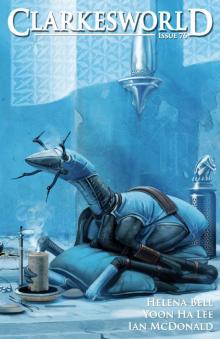 Clarkesworld Magazine Issue 76
Clarkesworld Magazine Issue 76 Brasyl (GollanczF.)
Brasyl (GollanczF.) Scissors Cut Paper Wrap Stone
Scissors Cut Paper Wrap Stone Chaga
Chaga Time Was
Time Was Cyberabad Days
Cyberabad Days Be My Enemy
Be My Enemy Changa
Changa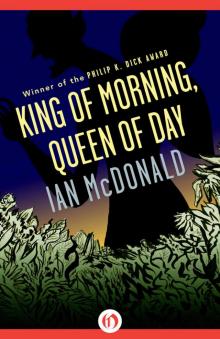 King of Morning, Queen of Day
King of Morning, Queen of Day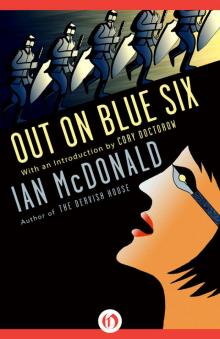 Out on Blue Six
Out on Blue Six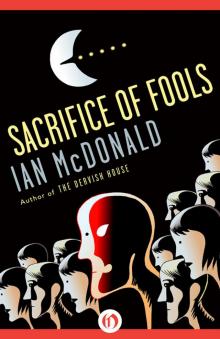 Sacrifice of Fools
Sacrifice of Fools Desolation Road
Desolation Road Luna--Wolf Moon--A Novel
Luna--Wolf Moon--A Novel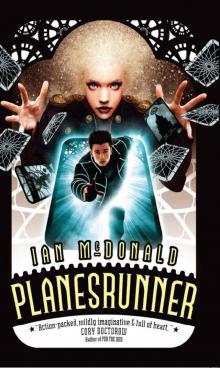 Planesrunner (Everness Book One)
Planesrunner (Everness Book One) Ares Express
Ares Express